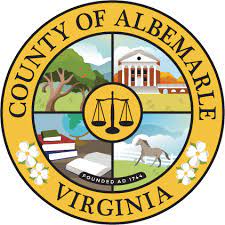The Affordable Housing Plan adopted by Charlottesville City Council in March 2021 established a moral commitment for the city to spend $10 million each year on affordable housing projects and administration. But how have previous funds for that purpose been spent since 2010?
“In summary, you’ve administered $46.7 million in funding [and] this is broken down into operating, program, development, and city administration,” said Callahan Seltzer, a principal with HR&A Advisors. “And when we see development here, we’re talking about new construction and rehab, so specific hard costs related to construction and rehab of affordable housing.”
HR&A Advisors were hired by Rhodeside & Harwell as a subcontractor for the overall Cville Plans Together initiative. HR&A wrote the plan, which helped inform the greater residential densities allowed under the new Comprehensive Plan adopted by Council last November.
City Council originally approved a Charlottesville Affordable Housing Fund (CAHF) in 2007. Very few staff who were around at the time are left in the city government.
Last July, the previous City Council agreed to pay HR&A Advisors an additional $165,000 to review how the CAHF has been used since 2010. The review’s purpose was to determine if the city was getting a return on its investment and to suggest reform. An initial review was presented to Council in December, but the rest of the report was the subject of a City Council work session on March 21.
“The study is also designed to redesign the program to make it more efficient and then to show some kind of accountability moving forward,” said Alex Ikefuna, the interim director of the Office of Community Solutions.
- View the March 21, 2022 presentation
- View the March 21, 2022 staff and HR&A report
- View the March 21, 2022 work session on the city’s website
That $165,000 also covers the costs of HR&A to write an inclusionary zoning program as part of the ongoing rewrite of the zoning code. That will come forward at a later date.
Seltzer said the review involved following up with transactions from the past 12 years. Around 95 percent of the funds have gone to eleven recipients.
There are two classes of recipients and they are households served versus units constructed. The study sought to create a metric to measure the efficiency of funding.
“We think it’s only one of many important metrics, and generally performance in terms of cost efficiency per unit, from what we see in the industry is very good,” Seltzer said. “You are getting a good amount of cost-efficiency per unit via the CAHF.”

Nearly half of the funding has gone to development of new units. Some highlights:
- In 2010, Virginia Supportive Housing was awarded $1.825 million for what would become the Crossings on 4th Street. There are 60 single-resident occupancy units there.
- The Thomas Jefferson Community Land Trust has been awarded $3 million since 2012. The land trust is now part of the Piedmont Housing Alliance.
- Habitat for Humanity has received nearly $3.9 million since 2010 for a variety of projects.
- Piedmont Housing Alliance received $5.545 million in 2021 for the Friendship Court redevelopment
- Charlottesville Redevelopment and Housing Authority has received a total of nearly $8.4 million, with significant amounts earmarked for redevelopment since 2018.
- The Albemarle Housing Improvement Program has received a total of $8.448 million primarily for rehabilitation of existing units.
Construction that is intended to subsidize the cost of housing always has multiple sources of revenue, but the above is direct investment of funds ultimately covered by city taxpayers either in terms of cash or bond proceeds.

Callahan said the review of the CAHF is intended to turn goals of the Affordable Housing Plan into reality, such as requiring affordability for as long as possible.
“So really trying to get 99 years of affordability whenever possible and we are working to help you get the right sight of agreements in place with your grantees that get you that longer term of affordability,” Seltzer said. “Twenty years at an absolute minimum would be our recommendation there.”
Those can take the form of covenants that return some of the value of the unit back to the city. One way to secure those covenants would be to restructure the Charlottesville Affordable Housing Fund as what Seltzer calls a “soft loan.”
“What that does is essentially bind that affordability and if a developer in ten or fifteen years decides they own the property, they have a covenant, but they’re okay to terminate that covenant because they’re going to sell the property and make a lot of money when they sell it,” Seltzer said. “It brings you back to the table to renegotiate and say, well, actually this is a loan. We paid for it as a loan and here you are needing to basically within your sale, we are going to recoup these funds so that we can reinvest in affordable housing in other ways.”
Seltzer said the city will need additional housing staff to track all of the information and to ensure the covenants and provisions are enforced.
One Councilor asked HR&A to give a sense of how Charlottesville is doing compared to other cities across the country.
“Charlottesville is punching above its weight on a per capita basis,” said Philip Kash of HR&A Advisors. “Almost any way you cut the numbers, you are very committed to this public policy priority.”
“You also have a very sophisticated group of affordable housing developers that I have not seen that level of sophistication in the southeast,” Seltzer said. “I think in Boston, New York, places where you have strong neighborhood-based [Community Development Corporations] with a 30 or 40 year history of neighborhood-based action. That exists, but it doesn’t exist in the southeast.”
However, both Kash and Seltzer said the administration of those funds has been lacking and better tracking will be required.
Deputy City Manager Sam Sanders said it is the intention of the city government to hire additional staff when the right positions are identified.
CAHF committee to be created
Another reform will be the creation of a committee to review competitive proposals for use of the city’s affordable housing funds. Council currently makes the ultimate decision with some guidance from the current Housing Advisory Committee. The new CAHF committee has not yet been named. Sanders said this will eliminate conflicts of interest such as members of nonprofits evaluating their own proposals.
“When you have one committee that’s been evaluating the actual proposals then that in itself leads to various confusion so the establishment of the CAHF committee is an attempt to pull the developers out of the conversation where they may have a direct benefit so that there are others that are fully vetting out those proposals and making a recommendation separate and apart.”
The Housing Advisory Committee would continue existing as a body to discuss policy, but would no longer be involved with making funding recommendations. The goal is to have all affordable housing proposals come through one channel.
“Anyone making a request for a housing investment to the city of Charlottesville should come through one door,” Sanders said. “That request should be factored against everything else that is being considered and it gives us a better ability to track it.”
Responsibility for this will be transferred to the Office of Community Solutions.
There is another work session on April 4 that will focus on affordable housing issues in Charlottesville.

Before you go: The time to write and research of this article is covered by paid subscribers to Charlottesville Community Engagement. In fact, this particular installment comes from the March 29, 2022 edition of the program. To ensure this research can be sustained, please consider becoming a paid subscriber or contributing monthly through Patreon.














Graphics and format are difficult to read; also, unpleasant. When the word “empower” is used, ie., used more than once or at all, it brings to mind a lack of acumen in the originator’s skill set. Footnotes with any relevant background information could be very beneficial.
Are you referring to the Affordable Housing Plan, or the story?
Dear Sean, I wonder if I was responding to a story in Charlottesville Tomorrow? I don’t see any applicable association with your article, ie., the repetetive use of the term “empowerment”. The above article citing HR&A’s report was very informative although missing key perspectives and details regarding the many incongruities and disparities in Cville’s development history or impact fees/coffers promised by developers that were not paid to the City. . . Penny
Repetitive. (Hey, how about an editing tool for these responses!)